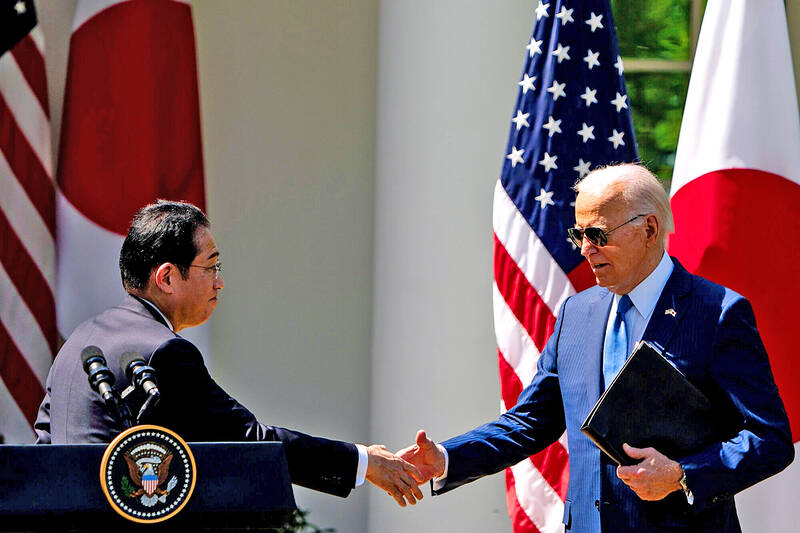US President Joe Biden and Japanese Prime Minister Fumio Kishida on Wednesday unveiled plans for military cooperation and projects ranging from missiles to moon landings, strengthening their alliance with an eye on countering China and Russia.
A joint news conference at the White House reflected the growing importance of Japan on the world stage and to the US, as the two leaders weighed in on Gaza and Israel, Ukraine and Russia, North Korea and other world flashpoints.
“This is the most significant upgrade in our alliance since it was first established,” Biden said after about two hours of talks that focused on the restive Indo-Pacific region, and China’s actions.

Photo: Bloomberg
The US and its allies, including Japan, have been bolstering their militaries to counter what they see as a growing threat from China in the South China Sea and the East China Sea, and to deter any attempt to seize Taiwan.
Biden said their militaries would cooperate with a joint command structure and they would, together with Australia, develop a new air missile defense network.
The two leaders also announced that Japanese astronauts are to participate in NASA moon missions.
Overall, the US and Japan have hammered out about 70 agreements on defense cooperation, including moves to upgrade the US military command structure in Japan to make it better able to work with Japanese forces in a crisis.
Japan is taking on a stepped-up global role after a series of security law changes in the past decade that have transformed its pacifist constitution.
Kishida is to address the US Congress today, and join Biden and Philippine President Ferdinand Marcos Jr for a meeting expected to focus on Beijing’s South China Sea incursions.
The meeting took place as China steps up pressure on the Philippines in the South China Sea over areas Beijing claims but international law says belongs to the Philippines.
China is attempting to isolate Japan and the Philippines, a US official said.
By meeting the leaders of those two nations this week in Washington, Biden is aiming to “flip the script and isolate China,” the official said.

The Central Election Commission has amended election and recall regulations to require elected office candidates to provide proof that they have no Chinese citizenship, a Cabinet report said. The commission on Oct. 29 last year revised the Measures for the Permission of Family-based Residence, Long-term Residence and Settlement of People from the Mainland Area in the Taiwan Area (大陸地區人民在台灣地區依親居留長期居留或定居許可辦法), the Executive Yuan said in a report it submitted to the legislature for review. The revision requires Chinese citizens applying for permanent residency to submit notarial documents showing that they have lost their Chinese household record and have renounced — or have never

A magnitude 5.6 earthquake struck off the coast of Yilan County at 12:37pm today, with clear shaking felt across much of northern Taiwan. There were no immediate reports of damage. The epicenter of the quake was 16.9km east-southeast of Yilan County Hall offshore at a depth of 66.8km, Central Weather Administration (CWA) data showed. The maximum intensity registered at a 4 in Yilan County’s Nanao Township (南澳) on Taiwan’s seven-tier scale. Other parts of Yilan, as well as certain areas of Hualien County, Taipei, New Taipei City, Taoyuan, Hsinchu County, Taichung and Miaoli County, recorded intensities of 3. Residents of Yilan County and Taipei received

Taiwan has secured another breakthrough in fruit exports, with jujubes, dragon fruit and lychees approved for shipment to the EU, the Ministry of Agriculture said yesterday. The Animal and Plant Health Inspection Agency on Thursday received formal notification of the approval from the EU, the ministry said, adding that the decision was expected to expand Taiwanese fruit producers’ access to high-end European markets. Taiwan exported 126 tonnes of lychees last year, valued at US$1.48 million, with Japan accounting for 102 tonnes. Other export destinations included New Zealand, Hong Kong, the US and Australia, ministry data showed. Jujube exports totaled 103 tonnes, valued at

BIG SPENDERS: Foreign investors bought the most Taiwan equities since 2005, signaling confidence that an AI boom would continue to benefit chipmakers Taiwan Semiconductor Manufacturing Co’s (TSMC, 台積電) market capitalization swelled to US$2 trillion for the first time following a 4.25 percent rally in its American depositary receipts (ADR) overnight, putting the world’s biggest contract chipmaker sixth on the list of the world’s biggest companies by market capitalization, just behind Amazon.com Inc. The site CompaniesMarketcap.com ranked TSMC ahead of Saudi Aramco and Meta Platforms Inc. The Taiwanese company’s ADRs on Tuesday surged to US$385.75 on the New York Stock Exchange, as strong demand for artificial intelligence (AI) applications led to chip supply constraints and boost revenue growth to record-breaking levels. Each TSMC ADR represents